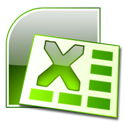Microsoft Excel — How To Create A Date-Variable Dynamic Report Header
No Need to Change Your Header — Make it Dynamic!
Overview
In September 2016, a presentation I gave at an accounting conference touched on the preparation of dynamic reports — reporting where data automatically updates based on a date driven variable.
I recently received a follow up question to that presentation:
“How can I create a DYNAMIC report header, containing the date selected in the drop down box?”
This post is focused on solely that aspect of what many accounting & finance professional deal with everyday — managing and updating your financial report descriptions!
Report Headers — From Static To Dynamic
The Objective
This is our starting point.
And the end game…
The Date field that drives the report, and the dynamic header, is based on a data validation drop-down box. The user chooses the report date, as follows:
Create Report Header Input Table
Start by setting up an input table, which enables us to identify what we will put in the Header Description.
- I put the table on the SAME SHEET, outside of the report print range.
The components of the Input Table — for this report — are:
- Month (Text)
- Year
- Period — YTD, LTM, Month?
- Report Title — Comparative or Trend?
- Text String — this is the text that populates the Report Header
- Purpose — just a reference note
Populate Input Table
Various Excel functions are used to accomplish this dynamic header. Whenever I refer to an Excel FUNCTION, I link to an overview and description (PLEASE explore if you don’t understand!).
The process for updating the Input Table is as follows:
Month — It is necessary to:
- identify the month (DATE function),
- show it as Text description (September, rather than “9”) — TEXT function, and
- display it in uppercase format, to conform with existing format — UPPER function
Year — use the YEAR function
Period and Title — these are input based on report type (they should never change once the report is set up — i.e., they only get input ONCE).
Text String — we have finished the creation of the Report Header variables, so now it is the simple step to create the string of text (using the CONCATENATE function).
- NOTE — I don’t actually use the CONCATENATE function. An Excel shortcut of that is to connect strings of text using the “&” — see link above (HOWEVER, you are concatenating the text)
Let’s Test It Out
September 2015
June 2016
Work through this one time and you will nail it!
Good luck!
About Don
“It’s time for DIFFERENT”
Don is passionate about helping professionals and organizations keep up and adapt to the changing business world that we operate in.

